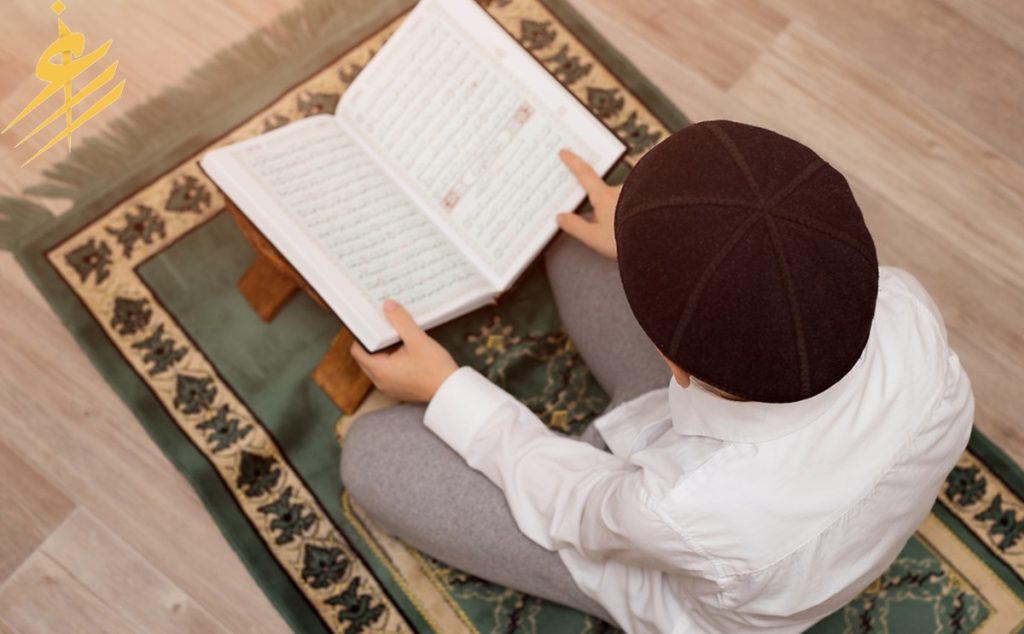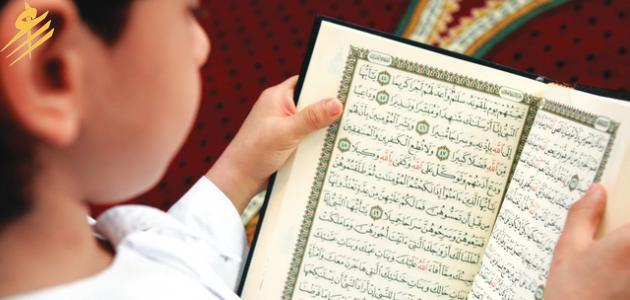In the beginning reading Quran by a woman in her home without wearing a hijab is permissible as long as she is safe from being seen by anyone other than her Mehrms. However, it is better to be polite with the Book of God Almighty to face the Qibla and to cover her body with something, even if it is not the full veil that the woman goes out with.
Etiquettes of reading Holy Quran
There are etiquettes of reading Holy Quran that we must adhere to, whether it is heartfelt or outward, it’s about if there is wearing hijab or facing the Qibla is or is it desirable or obligatory. This is a set of etiquette, some of which are obligatory and some are recommended by the text and some of them are desirable according to some scholars but there is no text for them.
First: Etiquettes of reading Quran with heartfelt
- To be sincere toward God in his reading by intending God’s pleasure and reward, to evoke the greatness of Quran’s revelation in the heart. Bin Masoud (may God be pleased with him) said: “A servant does not ask about himself except Quran. If he loves Quran, then he loves God and His Messenger”.
- Repentance and turning away from sins in general, as they remove the light of faith in the heart and face, weaken the heart, make it sick and weaken it, for a sick heart is the furthest from being influenced by Quran and in particular the servant should turn away from disobeying the tools of being influenced by Quran, which is the heart, hearing, tongue and sight. The forbidden exposes it for not benefiting from it in the right. One of the most serious sins and the greatest of which is preventing one from being influenced by Quran and contemplating it is listening to singing, music, musical instruments and distractions that turn hearts away from Quran.
- He should be present in the heart and expel self-talk during the recitation and protect his hands from messing around and his eyes from diverting their gaze unnecessarily.
- Meditation and trying to comprehend the meaning, because they are the commands of the Lord to World that the servant must be active in implementing after understanding and contemplating them.
- His heart interacts with each verse in a way that befits it, reflects on the meanings of God’s names and attributes according to the understanding of the predecessors, follows the conditions of the prophets and the righteous and considers the conditions of the deceivers.. and so on.
- The reader should feel that every letter in Quran is addressed to him personally.
- Affected and responds to every verse he recites, so at the threat, he diminishes in fear and at the time of the promise he rejoices with joy, when mentioning God, His attributes and His names, he falters in submission, when mentioning the infidels and their lack of manners and calls, he lowers his voice and breaks in his heart, shyness from the ugliness of their words and longs for Paradise when describing it, and trembles from the Fire when mentioned.
- To disavow those around him and his strength, since there is neither might nor power except with God, the Highest, the Great and he avoids looking at himself with the eyes of satisfaction and commendation.
- Avoiding obstacles to understanding, such as devoting all his attention to improving the letters and so on, he must also confine the meanings of the verses of Quran to the interpretation he teaches.
You can also check out: The Art of raising children.

Second: Etiquettes of reading Quran outward
- It is desirable to purify and perform ablution before reading, as it was narrated that Umar (may God be pleased with him) said: The Messenger of God (peace and blessing of Allah be upon him) said: (No one touches Quran except the pure one) Sahih Al-Jami’.
- He should be perfumed and clean his mouth with a Msiwak because it is the way of reading Quran.
- It is better for him to face the Qibla when he’s reciting Quran because it is the most honorable direction. If he does not face the Qibla, there is nothing wrong with that.
- To seek refuge in Allah from Satan, the accursed, starting recite with Bismallah, the Most Gracious, the Most Merciful, if he starts from the beginning of the surah.
- He should recite regularly and not forget, it should not go a day without reciting something from Quran so that he does not forget and does not abandon Quran.
- Not interrupting the recitation with useless words, avoiding laughter, confusion and speaking except in words that are forced into it, following the example of what al-Bukhari narrated on the authority of Nafi’.
- To improve his voice with Quran as much as he can (beautify Quran with your voice, for a good voice enhances Quran in beauty) Narrated by Ahmad, Abu Dawud and Ibn Majah, authenticated by Al-Albani in Sahih Al-Jami’. And to recite his recitation, the scholars have agreed that it is preferable to recite Quran in a recitation}. On the authority of bin Abbas (may God be pleased with them) said: “To recite a surah is more beloved to me than to recite the entire Quran”. Mujahid reported that he was asked about two men, one of whom recited Al-Baqarah and Al-Imran, the other recited Al-Baqara alone. He said: “The one who recites Al-Baqara alone is better”.
- He should respect Quran and not put it on the ground or place anything on it and not throw it at its owner if you want to give it to him and not touch it unless it is clean.
- Choosing the appropriate place, such as the mosque or a place in his house away from obstacles, concerns and confusion, or a garden or something else… The place must be far from what keeps the angels away from, for example bells and dogs….etc.
- Choosing the appropriate time when God reveals Himself to His servants and pouring His mercy upon his servants. The best reading is what is in prayer. As for reading outside prayer, it is preferable to read at night.
- Repeating the verse and be influenced by it, it was proven on the authority of Abu Dharr (may God be pleased with him) that he said: “The Prophet (peace and blessing be upon him) recited a verse until the morning” and the verse: “If you punish them, they are your servants” [Al-Ma’idah 78]. Narrated by Al-Nesa’ay and bin Majah. It has also been proven that many of the Companions used to repeat certain verses to think about and be influenced by them.
- Crying during recitation, especially when reciting the verses of torment or going through scenes thereof, when he brings up scenes of the resurrection and the events of the afterlife and manifestations of terror therein, then notices his shortcomings and negligence.
- The listener must follow all the previous etiquettes and add to it good hearing, good listening, reflection and good reception, not only open his ears but all his feelings and sensations. The Almighty said: “And when Quran is recited, then listen to it and be silent that you may receive mercy”. {Al-A’raf 204.}
Download jeras app from here, for more social, religious and educational articles.






